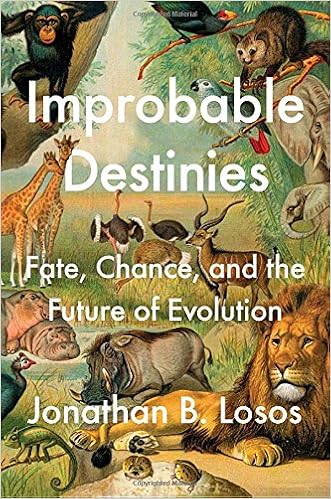
Many years ago, during a public lecture on the interface of religion and science, I was asked by a belligerent attendee whether I thought religion had been a force for good or evil in the world. I answered "Yes." Many apparent controversies are like that; their public presentation commits the fallacy of the excluded middle ("Either you're part of the solution or you're part of the problem"). This very readable book is about such a controversy in evolutionary biology, pitting the late S.J. Gould against Simon Conway Morris on the issue of chance vs. determinism. Gould famously argued that unique and unpredictable historical events cannot help but shape the future evolution of organisms (the "contingency" argument). Conway Morris points to the near-ubiquity of convergent evolution, in which unrelated organisms "solve" their environmental problems in very similar ways (think cacti and unrelated succulents, or placental vs. marsupial moles), as evidence for a large role of determinism in evolution. Both are "right." As with the immediately antecedent controversy (also involving Gould) over "punctuated equilibrium" vs. "phyletic gradualism," neither side can claim a monopoly on truth, but pursuing the controversy qua controversy can be good for one's career and reputation.
The first half of Losos' book surveys the arguments and some of the facts on the ground. That is, it's "gee whiz!" stuff. Parts of it read like the late Victorian evolutionary literature mocked by William Bateson, who wrote in "Materials for the Study of Variation" that the arguments presented therein amount to "if such-and-such happened, well, then, it did!" The second half is much more stimulating. Since the elaboration of the phenomenon of industrial melanism, we have come to realize that adaptive evolution can occur very rapidly even as we speak. Evolution presents a continuing tension between "phylogenetic inertia" or "niche conservatism" on one hand, and "local adaptation" or "rapid evolution" on the other. How can we reconcile, say, cases where naturalized species have evolved rapidly in their new geographic ranges, with the fact that carnivorous and scavenging beetles apparently showed no morphological change at all since the middle Quaternary? At any rate, Losos, who has been very prominent in studies of evolution in Caribbean Anoles (lizards), presents case after case in which real-time evolutionary experiments usually (but not inevitably) argue for determinism. All of these brilliantly-executed studies should be familiar to an educated public, but most are not. Were they better-known, creationists would be much less able to confuse the issues with their spurious arguments. There is thus a real need for books like this, accessible to the intelligent general reader. (There is little in it that is new to professionals, though the presentation alone makes it a good investment of time for us.) How to get the word out?
So is evolution contingent or deterministic? Yes.
No comments:
Post a Comment